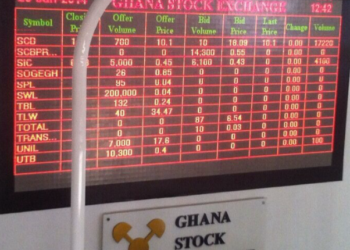The government of Ghana fell short of its treasury bills (T-bills) target in November 2024, raising GH¢21.5 billion against a gross target of GH¢22.8 billion.
This 5.5% shortfall has raised concerns about refinancing risks as obligations are projected to surge significantly to GH¢26.1 billion in December. While investor demand for T-bills increased by 27.2% month-on-month in November, the appetite was insufficient to fully meet the government’s elevated auction targets.
The November auction had mixed results, with all received bids being allotted to ensure the government met its immediate refinancing obligations. The allotted amount exceeded refinancing requirements by 8.3%, giving the government a temporary cushion.
However, the inability to reach the gross target highlighted underlying challenges in managing rising refinancing obligations and sustaining investor confidence in the short-term debt market.
The persistent shortfall in meeting auction targets could leave the government vulnerable to uncovered auctions in December, where refinancing obligations are expected to rise by 24.4%. This adds pressure to an already constrained fiscal environment as the government struggles to balance borrowing needs with economic stability.
Surge in Yields Reflects Rising Borrowing Costs
T-bill yields continued their upward trajectory in November, reflecting heightened inflationary pressures and the government’s aggressive borrowing to address liquidity needs. The 91-day yield climbed by 100 basis points (bps) to 27.2%, while the 182-day and 364-day yields rose by 70bps and 85bps to 28.0% and 29.8%, respectively.
This rise in yields, averaging 90bps across all T-bill tenors, underscores renewed uncertainty about inflation and sustained pressure on treasury borrowing. Analysts attribute the yield increase to the government’s need to make T-bills more attractive to investors amid persistent macroeconomic challenges.
Despite the auction falling short of its gross target, investor demand showed resilience in November, recording a notable 27.2% increase month-on-month. This highlights a growing preference for T-bills as a relatively safe investment option in the current economic climate.
However, the rise in demand was insufficient to fully offset the government’s elevated auction targets.
Market observers have noted that while short-term debt instruments like T-bills continue to appeal to investors, the government’s heavy reliance on domestic borrowing could deter participation in the future. Persistent borrowing pressures could also crowd out private sector credit, further straining economic growth.
A Looming Refinancing Challenge in December
Looking ahead, December 2024 poses a significant refinancing challenge, with obligations projected at GH¢26.1 billion. Analysts warn that unless the government can attract higher investor participation in upcoming auctions, it risks facing uncovered auctions, which could disrupt the refinancing process and deepen fiscal vulnerabilities.
To mitigate these risks, the government may need to explore alternative strategies, such as reducing auction targets or securing concessional financing, to manage the debt burden more sustainably. Addressing structural issues, including inflationary pressures and fiscal imbalances, is also critical to restoring investor confidence and ensuring long-term market stability.
Meanwhile, amid rising yields and duration risks, analysts have tipped the 182-day T-bill as the most attractive option for investors. While the 364-day yield climbed to 29.8%, it does not offer adequate compensation for the longer duration risk compared to the shorter-term 182-day tenor. Investors seeking a balance between liquidity and fair returns are likely to favor the 182-day option in the near term.
This recommendation highlights the need for the government to design more strategic borrowing plans that align with investor preferences and market conditions.
In all, the government’s inability to meet its November T-bills auction target underscores the growing challenges in managing short-term debt financing amid persistent economic pressures. While rising yields have attracted greater investor interest, the overall demand remains insufficient to fully meet elevated auction targets.
READ ALSO: Ghana’s Oil Marketing Companies Resilience to Sustainable Energy























